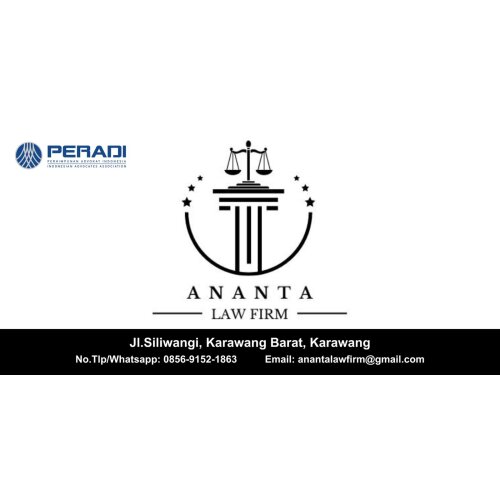Best Telecommunications and Broadcast Lawyers in Karawang
Share your needs with us, get contacted by law firms.
Free. Takes 2 min.
List of the best lawyers in Karawang, Indonesia
About Telecommunications and Broadcast Law in Karawang, Indonesia
Telecommunications and broadcast law in Karawang, Indonesia, is governed by a combination of national regulations and local policies. This sector is primarily regulated by the Indonesian Ministry of Communication and Information Technology, which oversees the establishment and operation of telecommunication infrastructure, licensing, content regulation, and more. Karawang, being a rapidly developing area within the West Java region, is witnessing a growing demand for robust telecommunication networks and broadcast services, making compliance with legal standards crucial for businesses and individuals alike.
Why You May Need a Lawyer
There are several situations where you might require legal assistance in the field of telecommunications and broadcast in Karawang:
- Setting up a new telecommunications or broadcast service requires navigating complex licensing requirements.
- Disputes over content control or copyright infringement issues within broadcast media.
- Challenges related to regulatory compliance for telecommunication businesses.
- Negotiating contracts with service providers or content distributors.
- Technical and contractual issues involving infrastructure development, such as tower placements.
- Privacy and data protection concerns related to telecommunication operations.
Local Laws Overview
Karawang adheres to a combination of national and local laws that guide the telecommunications and broadcast sector. Key aspects include:
- Telecommunications Law: National law regulates licensing, operational standards, and competition within the sector.
- Broadcasting Law: This involves the regulation of content, licensing, and public service obligations.
- Electronic Information and Transactions Law: Governs digital communications and online content, including issues related to cybercrime and data protection.
- Regulation of Local Authorities: Local government may impose additional requirements and zoning regulations regarding telecommunication infrastructure.
Frequently Asked Questions
What licenses are required to operate a telecommunications business in Karawang?
To operate a telecommunications business, you need a series of licenses, including operational, facility-based, and service delivery licenses issued by the Indonesian government.
How is broadcast content regulated in Indonesia?
Content is regulated under national broadcasting laws that outline what is permissible in terms of language, cultural appropriateness, and legal standards.
Are there special zoning laws for placing telecommunications towers?
Yes, local government policies and zoning laws stipulate where you can place telecommunications infrastructure to address community and environmental concerns.
How can I protect my broadcast content from piracy?
Legal frameworks regarding copyright protect broadcast content, and imposing technological measures can also help prevent unauthorized use.
What recourse is available for contract disputes with service providers?
Dispute resolution can be achieved through negotiation, arbitration, or litigation, with legal counsel guiding the best approach based on your circumstances.
How do privacy laws apply to telecommunications in Karawang?
Privacy laws are governed by national regulations that mandate how personal data collected by telecom companies must be handled and protected.
Is there government assistance for setting up telecom infrastructure?
Sometimes, government incentives or public-private partnerships are available to encourage infrastructure development. Local regulations and opportunities should be explored.
What are the penalties for non-compliance with telecommunications laws?
Penalties include fines, revocation of licenses, and in severe cases, legal action can be taken against the offending parties.
Are there any local organizations offering support for media outlets?
Various local and national organizations provide support and resources to media outlets, promoting professional standards and offering assistance in legal matters.
How can one stay updated on changes to telecommunications laws in Indonesia?
Keeping abreast of changes requires following updates from relevant government agencies, industry journals, and possibly enrolling in professional associations related to telecommunications and broadcasting.
Additional Resources
For more information and assistance, consider reaching out to the following organizations:
- Ministry of Communication and Information Technology: Provides up-to-date information on regulations and licensing.
- Komisi Penyiaran Indonesia (KPI): The Indonesian Broadcasting Commission monitors and regulates broadcasting standards.
- Local government offices in Karawang: Can provide detailed local regulations and compliance requirements.
- Indonesian Telecommunications Society (MTSI): Offers industry insights and professional networking opportunities.
Next Steps
If you seek legal assistance in telecommunications and broadcasting in Karawang, consider the following steps:
- Identify your specific legal needs and the issues you are facing.
- Research local attorneys or law firms that specialize in telecommunications and broadcast law.
- Prepare all relevant documents and a clear outline of your legal issues for consultation.
- Schedule consultations to discuss your situation and explore potential legal strategies.
- Ensure that the lawyer you choose has experience and a proven track record in telecommunications and broadcast law.
Lawzana helps you find the best lawyers and law firms in Karawang through a curated and pre-screened list of qualified legal professionals. Our platform offers rankings and detailed profiles of attorneys and law firms, allowing you to compare based on practice areas, including Telecommunications and Broadcast, experience, and client feedback.
Each profile includes a description of the firm's areas of practice, client reviews, team members and partners, year of establishment, spoken languages, office locations, contact information, social media presence, and any published articles or resources. Most firms on our platform speak English and are experienced in both local and international legal matters.
Get a quote from top-rated law firms in Karawang, Indonesia — quickly, securely, and without unnecessary hassle.
Disclaimer:
The information provided on this page is for general informational purposes only and does not constitute legal advice. While we strive to ensure the accuracy and relevance of the content, legal information may change over time, and interpretations of the law can vary. You should always consult with a qualified legal professional for advice specific to your situation.
We disclaim all liability for actions taken or not taken based on the content of this page. If you believe any information is incorrect or outdated, please contact us, and we will review and update it where appropriate.








